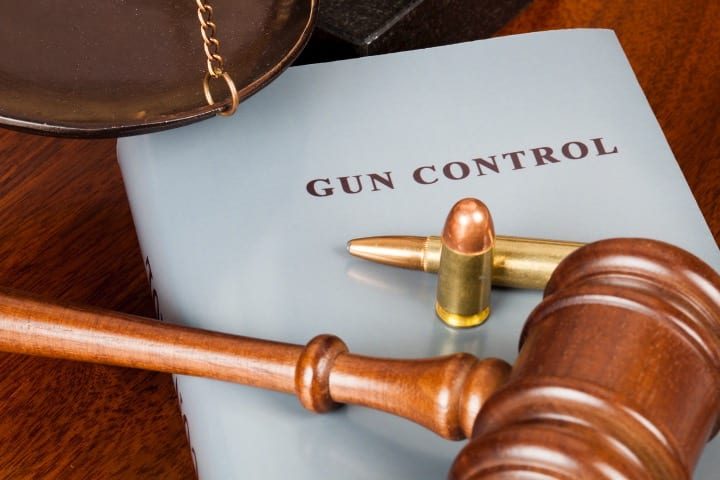
“He that institutes, may also abrogate, most especially when the institution is not only by, but for himself. If the multitude therefore do institute, the multitude may abrogate; and they themselves, or those who succeed in the same right, can only be fit judges of the performance of the ends of the institution.” — Algernon Sidney, Discourses Concerning Government
According to WREG.com, in response to the numerous incidents of armed violence in their city, the Memphis City Council is considering gun control measures stricter than those in force in the state of Tennessee.
“First of all, the whole thing [a May 3 shooting at a Memphis TV station] is horrific and sad, and unfortunately, it’s not just this thing,” Chase Carlisle, a Memphis city councilman told WREG. “It’s been a series in Memphis, in Tennessee, and around the nation that has been happening far too often.”
WREG.com informs that the city ordinances being discussed could, if the strictest of them is enacted, ban assault weapons and permitless carry in Memphis. They quoted Carlisle and another councilman:
“You should have the right to carry a firearm, but we want you to do so responsibly, and no one has really defined what responsible gun ownership really is,” Carlisle said.
“And if we’re not being protected by our state then we have to step up and do what we need to do and I assume when we do pass this, we’ll be in court,” city councilman Jeff Warren said.
Statewide, Tennessee has one of the least restrictive gun control policies in the union. However, in the days after the armed attack at the Covenant School in Nashville, Governor Bill Lee issued a statement announcing he would soon call for a special session of the state Legislature to consider enacting stronger measures, including red flag laws.
There is much to be said about government at any level presuming to possess the authority to disarm their citizens. Actually, there’s only one thing to be said: they cannot possibly be granted power to restrict the right of the people to keep and bear arms because, as representatives of the people, government cannot have power over people that the people themselves don’t have.
Neither the Memphis City Council, nor the state’s governor, nor the president, nor the Supreme Court, nor Congress could logically be granted by the people power that the people don’t possess. In other words, you can’t give someone something if you don’t have that thing, and no one man has the right to seize the firearms of another man, regardless of how often firearms are used in the commission of crimes.
Such gun control schemes deprive the people of their personal liberty — liberty that government exists to protect, preserve, and defend — and they subject gun owners who’ve never committed a crime with their firearms to all the disagreeable circumstances and punishments that should only befall those who’ve been charged with a crime and found guilty.
People who believe personal ownership of weapons is a threat to peace are free to not own a weapon, as well as to forbid anyone who carries a gun from entering their homes or businesses. It is the right of every property owner to exercise sovereignty over his property. That right is at the heart of republican government.
Nullification?
But, why can’t the Memphis City Council nullify the laws of the state, the way the state may nullify unconstitutional acts of the federal government? The answer is simple.
Put simply, states may nullify unconstitutional acts of the federal government because the states are the creator and the federal government is their creation. There would be no federal government had the states not created it and set forth its powers in the Constitution. The federal government, in point of fact, has no sovereignty, as sovereignty is defined as the power to make law without the approval or permission of another. Every power possessed by the federal government was granted to it by the states, and the states retain the power to refuse to cooperate in any act of the federal government that exceeds the authority granted to it in the contract that created it. Simple.
As for Memphis, though, as for every other city in Tennessee, it exists because the state government granted it a charter. In 1826, people living in what is today Memphis petitioned the state for a charter, and in December of that year the state Legislature issued a charter for Memphis, incorporating it as a subordinate municipality of the state of Tennessee.
The Memphis City Council, then, is not sovereign, as it relies on the charter issued by the state for its authority to legislate within the borders of the city. An inferior entity cannot refuse to enact the laws of its superior.
Strictly speaking, then, should Memphis try to nullify state gun laws by enacting ordinances that go contrary to the laws enacted by the state Legislature, then that same Legislature, as the issuers of the document that incorporated Memphis as a city, could withdraw that charter.
All of that said, however, as explained above, no government is endowed with authority to disarm citizens, as government gets all its authority from the people, and the people themselves do not have the authority to disarm their fellow citizens.
The Memphis City Council (and many other cities and states) don’t understand this simple fact of political science and republican self-government, as is evident in the words of Councilman Warren:
I think what we’re trying to do is get some type of reasonable gun control, not gun annihilation. We’re never going to do that in our country, but we can have some type of control registration.
No, sir. You have no power to enforce any type of gun control or registration. You may exercise usurped authority to do that, but that would be government by force, not by consent. And, the right to keep and bear arms is not a constitutional right, it is a natural right — and only the giver of a right has the power to abrogate it.



